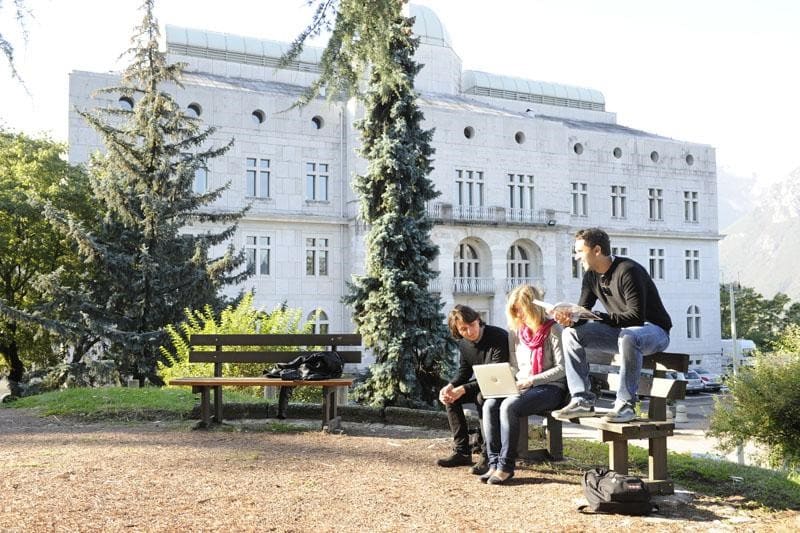
MSc in Environmental Meteorology
University of Trento

Key Information
Select location
Campus location
Trento, Italy
Languages
English
Study format
On-Campus
Duration
2 years
Pace
Full time
Tuition fees
EUR 4,500 / per year **
Application deadline
Request info *
Earliest start date
Sep 2024
* first call: from 18 December 2023 until 29 February 2024 at noon (CET) for non-EU citizens living abroad, Italian citizens, EU citizens, and non-EU citizens regularly living in Italy.| second call: from 15 April 2024 until 28 June 2024, at 12.00 noon (CET) only for Italian citizens, EU citizens, and non-EU citizens already living in Italy at the time of application
** EU 340€-3400€ (fee range based on personal income and merit); Non-EU: 1000€-4500€ for the first year (fee range based on merit only, i.e. score in the application evaluation). 1000€-6000€ for the second year (fee range based on academic performance).
Introduction
The Master of Science program in Environmental Meteorology is a double degree jointly offered by the University of Trento and the University of Innsbruck, Austria. Upon fulfillment of all the requirements, graduates will obtain two distinct degrees, one from each university.
The program courses cover a variety of topics related to atmospheric and climate processes and their connections with environmental systems. Students will be stimulated to get familiar with different ways of approaching weather, climate, and the environment, including experimental techniques, theoretical analysis, and numerical simulations.
Graduates in Environmental Meteorology will be enabled to prepare and present weather forecasts, perform atmospheric and environmental measurements, analyze observational data, and work with numerical models for the simulation of atmosphere, climate, and environmental processes.
The Master's programme lasts officially 2 Academic Years. The official teaching language is English.

Admissions
Curriculum
To fulfill all the requirements prescribed by the Master's regulation, students must obtain a total of 120 ECTS credits.
First Year
1st semester (at the University of Trento)
- Introduction to meteorology and climatology (6 ECTS)
- Environmental Fluid Mechanics (9 ECTS)
- Environmental measurements (9 ECTS)
- Environmental physical chemistry (6 ECTS)
2nd semester (at the University of Trento)
- Atmospheric boundary layer and turbulence (6 ECTS)
- Numerical methods for environmental processes (6 ECTS)
- Hydrology (6 ECTS)
- Biosphere, atmosphere, and climate interactions (6 ECTS)
- Elective courses (6 ECTS)
Second Year
1st semester (at the University of Innsbruck)
- Atmospheric radiation and remote sensing (5 ECTS)
- Reading, writing, and presenting scientific content (3 ECTS)
- Atmospheric chemistry and biogeochemistry (6 ECTS)
- Dynamical and synoptic meteorology (6 ECTS)
- Elective courses (10 ECTS)
2nd semester (either at the University of Innsbruck or at the University of Trento)
- Master Thesis (30 ECTS)
Elective Courses (Subject to change)
1st Year - II Semester - Trento campus
- Air pollution modeling (6 ECTS)
- Hydrological modeling (6 ECTS)
- Introduction to climate change (6 ECTS)
- Tropical meteorology and climate (6 ECTS)
2nd year - I semester - Innsbruck campus
- Physics of the Climate System (5 ECTS)
- Mountain Meteorology (5 ECTS)
- Numerical modeling of Weather and Climate (6 ECTS)
- Climate and Cryosphere modeling (3 ECTS)
- Geostatistics (5 ECTS)
- Advanced Topics: Aviation Meteorology (4 ECTS)
- Scientific Programming (5 ECTS)
- Cryosphere in the climate system (5 ECTS)
- Advanced Topics: Avalanches (6 ECTS)

Efrem Bertini
Program Outcome
The Master&rsquo's program in Environmental Meteorology offers a variety of content related to the physical and chemical properties of the Earth's atmosphere, the phenomena governing its dynamics, and their connections with processes affecting environmental systems, such as the hydrosphere, the lithosphere, the biosphere, and the ecosystems.
All the processes related to weather and climate phenomena - such as clouds and precipitation, atmospheric radiation, air pollution, and wind dynamics - will be treated in depth.
The courses offered within the program enable students to become familiar with a variety of approaches, including theoretical analysis, measurement techniques, observational methods, data analysis, and computer simulations of environmental processes using numerical models.
In addition to mandatory courses, covering the required background of an environmental meteorologist, students will be able to focus their curriculum more specifically on their preferred topics through optional courses and their MSc thesis.
The knowledge and skills learned in the program will provide graduates with a sound background to face the subsequent training required for a variety of jobs - such as weather forecaster, aviation meteorologist, meteorological consultant, climate analyst, environmental meteorology expert in support of planning and/or management activities, teacher - or to proceed to higher levels of educations (e.g. doctoral studies).

Roberto Bernardinatti
Scholarships and Funding
Scholarships for non-EU citizens living abroad
Top-scored candidates will be entitled to receive a UniTrento scholarship according to availability. Students who benefit from a UniTrento scholarship will also have their tuition fees waived. For more detailed information check the UniTrento tuition fees and scholarships web page.
Scholarships for EU Citizens and Non-EU citizens regularly living in Italy
Information on the tuition fees and ISEE is available on our website. Please note that if you do not want to calculate the ISEE index (economic index of the financial situation of your family), you will have to pay the maximum amount.
Once the ISEE has been calculated students, if eligible, can apply for the Opera Universitaria scholarship, starting from June/July.

UniTrento Archive
Gallery
Career Opportunities
- Weather forecasters (in either public or private weather services or as freelance professionals);
- Consultants (for engineering firms, agricultural operations, insurance companies, legal issues);
- Aeronautical meteorologists;
- Experts in the assessment of solar radiation, wind, and precipitation for energy conversion from renewable sources;
- Experts in air quality monitoring and management;
- Researchers, academics;
- Experts in education and communication: instructors, media operators, teachers;
- Environmental meteorologists provide meteorological support and assistance to decision-makers in a variety of fields: air quality monitoring and management, civil protection, transport infrastructures management (including aviation, railways, roads, and navigation), water resource management, management of systems for energy conversion from renewable sources, agricultural operations, forest management.

UniTrento Archive